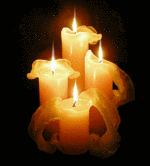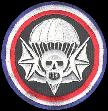
ROBERT g gEHRETT
|
IN MEMORIAM |
|
It's with great sadness that I announced, the 2nd February, Bob passed away.
If you pass here, stop you 5 minutes and
think of what Great Man made for you. |
Many thank you to my friend Dominique Potier which alowed me to contact with Betty Rye, the Gehrett's daughter. Thank you so much to Betty who took the time to answer me, to transmit all my questions to his dad. Finally, many thank you to Robert Gehrett for agreeing to answer any questions!
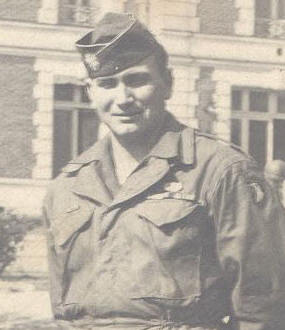 <= Robert Gehrett in the
40's
<= Robert Gehrett in the
40's
Normany 2010 =>
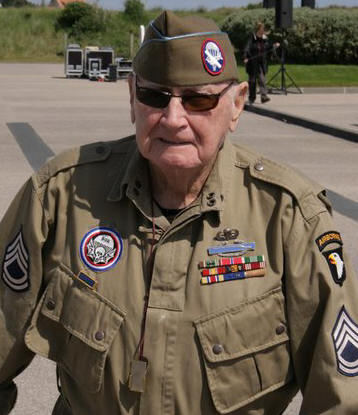
Robert G. Gehrett was born on 21 June 1924 to Huntingdon, Pennsylvania. His father, James Gehrett worked for the railroad. His mother, Catherine, raised their four children, Virginia, Bertha, James and Robert. His Brother, Jim, served in the military in WWII, in the Army Air Force.
Robert lived his childhood during the Great Depression. Little boy, Robert would sell his mom’s homemade breads and pies to make extra spending dollars for the family. His mother was a wonderful cook.
But, despite the crisis, Robert had a happy childhood. He often went fishing with his father. His parents were good Christian people and very active in their church.
“In 1940 World War II broke out in Europe and through the influence of my Dad and Senator Dick Simpson I was picked to attend the trade school at the farm show building in Harrisburg, PA at the age of seventeen. I left home on my own with $20.00 and a train ticket to Harrisburg and went to six months of Aviation Mechanics School. After school I went to Middletown Air Depot which is now Harrisburg Airport as a mechanic. I had high grades at school so the government made me after several months an assembly line foreman and I was in charge of 30 people all older than me.”
“While I was at Middletown my Brother Jim was drafted into the Air Force on December 23, 1941. I was drafted and went to Altoona for my physical and while I was there the brass out of Middletown pulled me out of the line and said they were going to place me as 4F because of Jim already being in the service and all my life long buddies in the line I refused the offer even after they told me I would never have to serve as I was needed there to run the assembly line. I passed the test and was cut orders to report to New Cumberland on January 1942.”
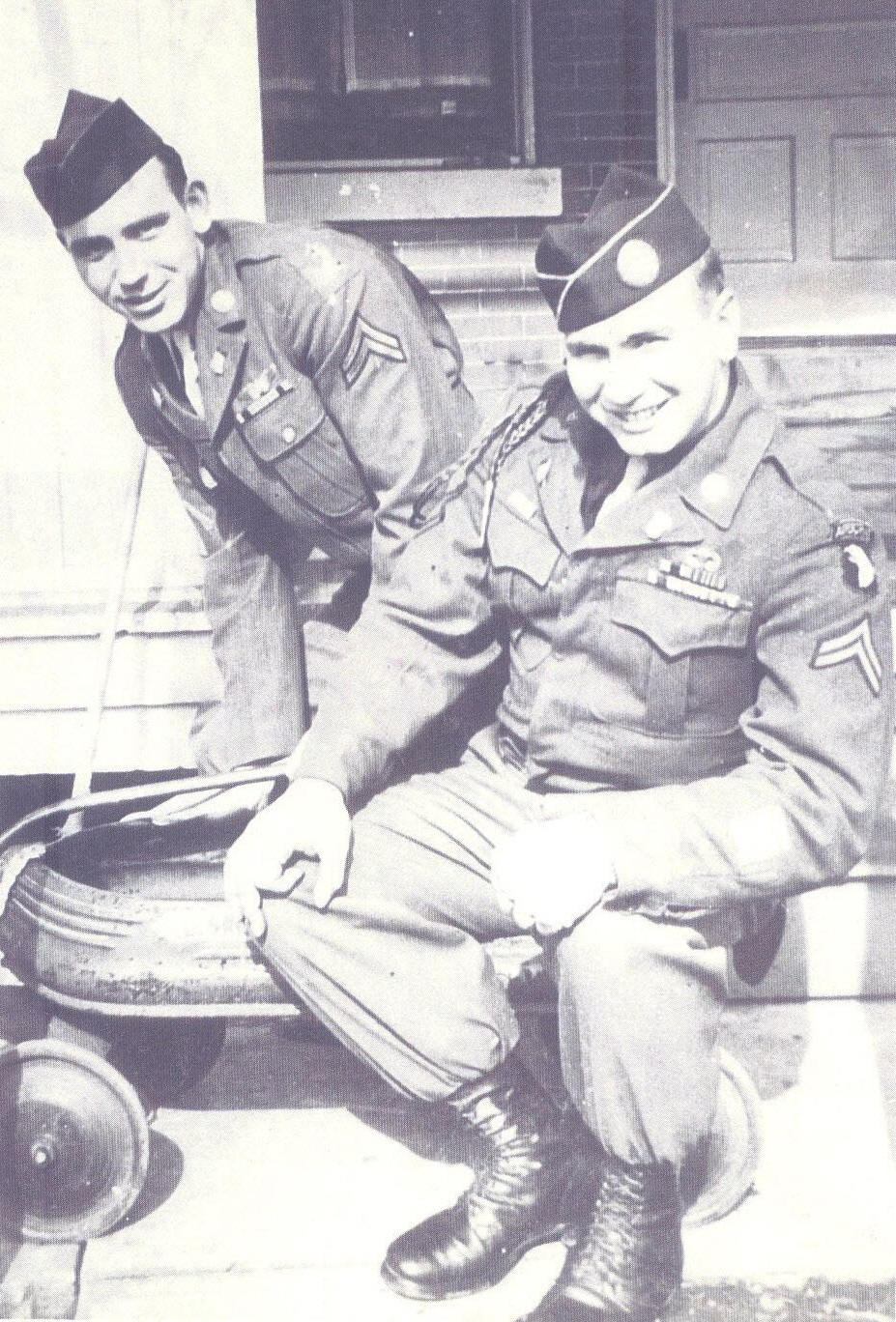 Robert and his brother Jim. Photo taken in the "home" after the war, 1945
Robert and his brother Jim. Photo taken in the "home" after the war, 1945
“Upon arriving at New Cumberland and being processed I was given a three day pass and went home and reported back two weeks later I was shipped by rail passenger train to Ft. Leonardwood, Missouri for 16 weeks of basic training as a combat engineer. While there I went to heavy equipment mechanics school for six weeks and after I got out of basic we just worked around and did a lot of engineering skills. That early spring the 101st Airborne Division put on a demonstration and afterwards they asked for volunteers and I signed up. Two days later they flew ten of us to Ft. Benning, Georgia. There I took six weeks of jump training and got my wings shortly after that was put on the S. S. Strathnaver (a cattle ship) with 101st Airborne Division and ended up in Jolly Ole’ England.”
“I was in the 502nd Airborne Regiment HQ & Co. I was Squad Leader of the 3rd Squad special rifle squad all of which held sharpshooter or expert rifle badge. I earned expert, the highest class in the 502nd. Was stationed in a beautiful little country side town of Swendon, England in Huts. Each squad had a hut. Once there we started night jumps to train for D-Day. Shortly after we gathered on May 29 and we were taken to an air base close by where we did our night training and then were placed in a hanger and were quarantined. No one could leave the hanger and they had MPs guarding us. They didn’t want any secrets to get out.”
Finally, the 5 June 1944, they warned that the Great Day had arrived! The paratroopers walked into this single file towards their C-47. The men of the 502nd PIR would take off from Membury and Greenham. The C-47 took off towards Normandy and specifically DZ A near Saint-Martin-de-Varreville. But the strength of the FLAK and clouds dispersed the plane.
Robert remembers his jump:
“We were put out at 500 ft. (the same height as the Washington Monument). My chute was only open several seconds until I was on the ground and when I was coming down I looked up and my canopy had 4 bullet holes in it.”
Robert landed six miles behind enemy lines right outside St. Mere Eglise in a field surrounded by hedgerows. He was far from his DZ and he was also alone.
“Everyone was very scattered. I found 3 guys from the 506th PIR and then as we walked towards town we started finding more and more of the 502nd unit.”
“I remembered most was that their orders were to gather troops and head towards Carantan securing the area – when we got near Carantan we were told to dig in and dig in deep – the next thing I knew here came about 400 planes and they literally leveled Carantan (as we say here – turned it into a parking lot). I wasn’t expecting that.”
The 502nd PIR fought until 29 June 1944. Then they were sent to Cherbourg to embark on a boat and return to England.
"Badly shot up there was 13,250 paratroopers starting out and 8,000 of us made it back, the rest were either killed or wounded.”
In England, during the two next months, 502nd PIR got new men and started to train themselves again to prepare the next operation.
“They sent replacements from Ft. Benning, GA to take the place and we got back up to 11,000 paratroopers.”
Several times the 101st Airborne Division was ready to land in France but each time, the operation was canceled.
During this period, Robert was given leave pass to go to London.
“We were feeling good about how the war was going and they gave us weekend passes but we had to keep in touch with the base every 12 hours.”
“One thing about England they had a wonderful transportation system. You could go anywhere up to 200 miles and be back in three hours England had few cars then. They had four large train stations in London. Trains left every 15 minutes to most large cities. The stations were all on the same line about 5 miles apart and the train you got on in London went through all four stations and the tickets were all one price. You could go from London to Manchester about 150 miles for $1.50 in U.S. Money or 3 shillings in English money. The British people were nice to us and needless to say I had a great time. I was in London, Manchester, Blackpool, Edenberg, Gloucester, and South Hampton.”
Its permissions in England, Robert remembers was a lot of young guys on the town. He said they had to keep the 82nd and the 101st separated on different weekend leaves because they would always get into fights in the taverns!
“The fight start by saying: “AA-stands for Almost Airborne”.
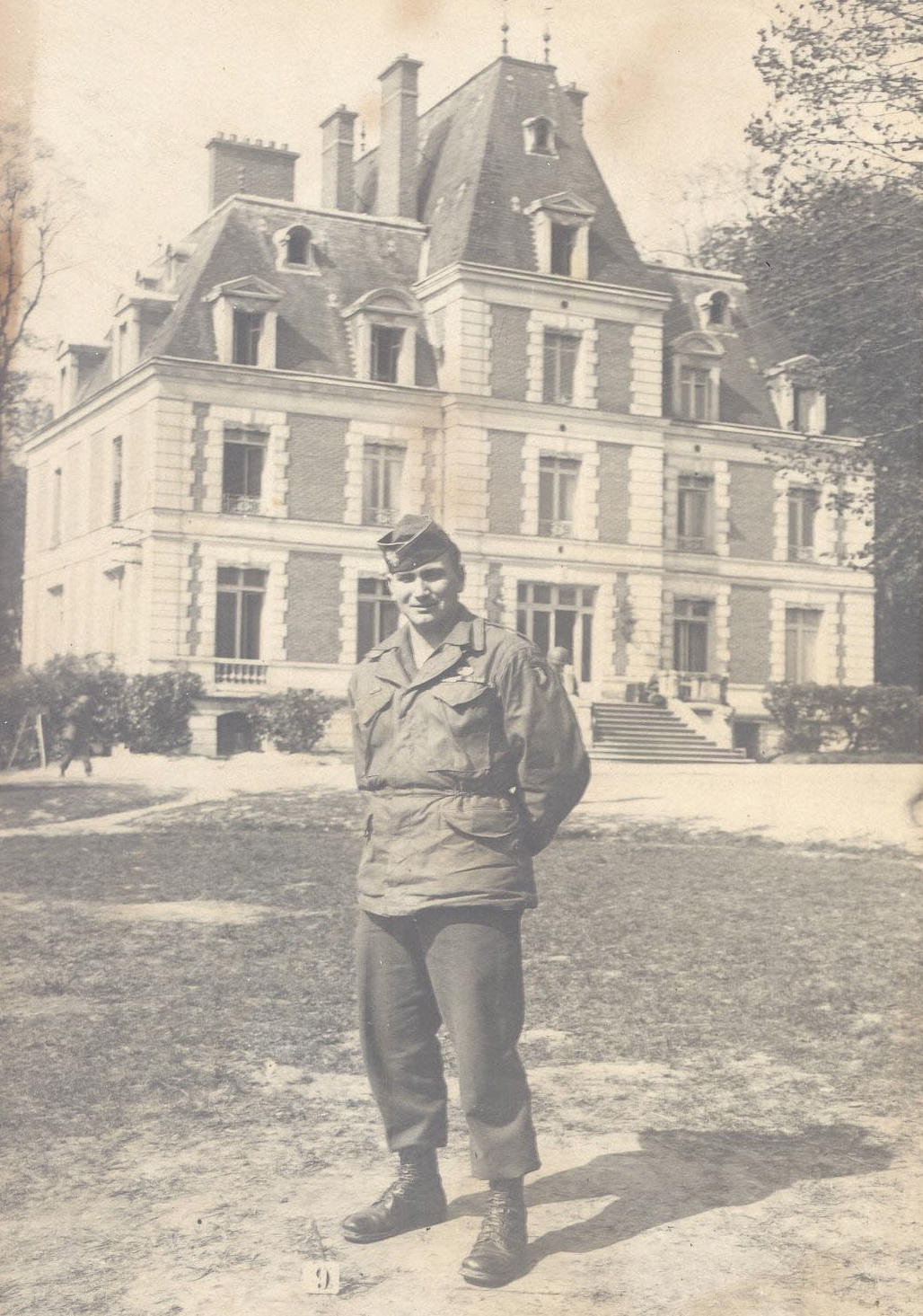
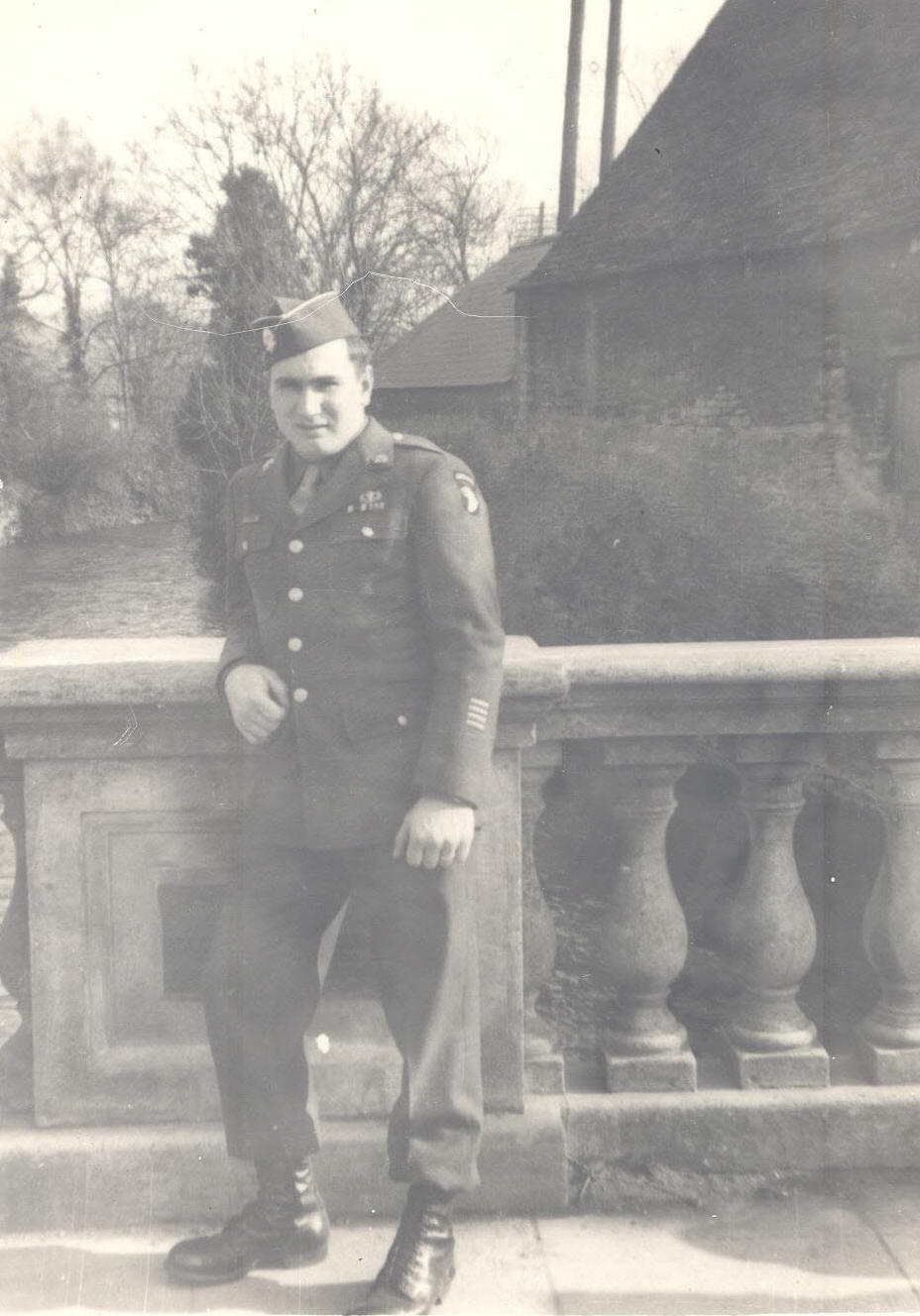
Photos taken in 1944(England?)
After less than three months in England, the 502nd PIR make are second jumps. Their objective was to jump on DZ C and take a road bridge above the Dommel River in St Oedenrode and the railroad bridge and roads leading of the small town of Best. It also the mission to keep the DZ B and C for the glidertroops. Their jump was made 17 September 1944 at 13:15 pm. After a flawless jump, the men headed toward their objective.
After catching their objective, 502nd followed 101st who moved in the sector of “the Island” in the south-west of Arnhem. 502nd stayed in backup, close to the city of Dodewaard. The actions were limited to patrols to locate the enemy infiltrations. During these actions, paratroopers of 502nd PIR were especially victim of the German mines.
“We got out better than France. We lost only about 3,000 killed or wounded that time.”
Robert a lot of memories of fighting in Holland but that he will never forget took place in Son. His daughter says:
“It was being at the Bridge of Son where he lost several of his friends and comrades – horrible fight that lasted for days! He would not get off the tour bus that day when we stopped there on our tour – too emotional at times for him!”
Finally, in December 502nd PIR and the 101st, were withdrawn from fighting zone and were sent in an old garrison located at Rheims in France, called Mourmelon. During this time, men rested, the training was limited to gymnastics. Red Cross assured some theater show to divert the men. But this period will remain short.
On December 16, 1944, Germans launch a great offensive in the Ardennes Forest, heading for American defenses ensured by VII Corp. The objective was re-occupy Antwerp, the only major harbor close to the fighting zone were huge amounts of food were disembarked. 101st Airborne was quickly dispatched towards the city of Bastogne, strategic city, were crossroads of several important roads met up. On the night of the 18 December, the troops were led to Bastogne in a long and tiring trip.
“We went about five miles east of Bastogne to a small village surrounded by farms and hills. We dug fox holes and waited for the Germans to come along, but they just surrounded us and tried to get us to surrender but General McAuliffe said the famous words that could be heard all around the world. On the 24th of December we could hear the sound of tanks and troops getting closer and being surrounded we couldn’t get any supplies, food or ammo. Socks and dry boots was what we needed there. There was 18 inches of snow and 20 degrees below zero.”
502nd PIR held positions in the North and the North West of Bastogne. And, Germans who weren't managing to break American defenses sent patrols.
In the sector held by 502nd, the attack occurred the morning after Christmas, in the area of Hemroulle. Many panzers penetrated the lines. To finish, on December 26 tanks belonging to 4th Armored Division from Patton’s III US Army broke surrounding.
All men suffered terribly from the cold. Robert Gehrett suffered from frozen feet or what they call trench foot.
“I was taken back to Brussels, Belgium to Hospital for 4 days and then back to England to a hospital for six weeks. My feet luckily didn’t get gangrene like a lot of the men that went back with me.”
“After I got out of the hospital the Army said I could not join my outfit as the Germans declared the HQ & HQ Co. prisoners of War and could not be put back in combat so they put me in the Airborne at Burtonwood, England. I stayed there until the spring and reenlisted for 18 months. Come back to the U.S.A. and landed in New York. Was told to report to Indiantown Gap, Pennsylvania after a week I was issued a 90 day furlough.”
“I went home to Huntingdon by train. While I was overseas Mom and Dad bought the big brick home of Mussie Black and sold the old homestead. It was the house Mom always wanted. It was about to be taken for back taxes. Mrs. Black always said she wanted Mom and Dad to have the house so she let them have it for the $4,000 she owed in taxes.”
“I surprised them by walking in while they were having breakfast. They were more surprised to see me walking. I never told them how bad or if I was injured badly in the war. Several weeks later Jim came home from California. He never left the states. We had a good time and enjoyed my 90 day furlough. I reported to Andrews Field, Maryland to start my 18 months reenlistment. The Air Force picked up on my experience with airplanes and I was made crew chief on Beechcraft 5 seater small executive type plane. Later on was transferred to Assistant Crew Chief on B25 bomber and later made Crew Chief.”
After that, Robert worked for a while as a street car driver in Washington, D.C., and he also worked for Greyhound Bus Lines.
February 14 1947, Robert married his girlfriend, Reba whom he met during the summer 45. Unfortunately, Reba passed away in September 2010. They were married for 64 years. They had two daughters, Betty and Cathy.
In 1952, he returned to the army. Her daughter, Betty, said: “Dad went to work for the National Guard in Washington, DC until he retired. He was the chief maintenance engineer at Andrews Air Force Base – was in charge of about 40 men and kept the tanks, jeeps, deuce and a halves, etc. up and running. He has now been retired longer than he worked – not too many people can say that. He retired young – at the age of 54.”
He left the army with the rank of 1st Sergeant.
Robert, at his majority, dropped out of high school to join the army. During his retirement, he followed a program for veterans and finally got his degree in 2002.
His daughter remembers.
“He graduated from Huntingdon High School in Huntingdon, PA. He walked across the podium and accepted his diploma in his uniform and then saluted the graduating class – not a dry eye in the auditorium.”
Since the end of the war, Robert Gehrett was never returned to Europe until June 2010, 66 years later.
“Mother never wanted Dad to return to Normandy because she had to live with him for years having nightmares. Was always waking in the night fearful of “Jerri’s and Krauts”
Robert and his daughter Betty followed the "Band of Brother Tour" in June of 2010. Robert returned for the first time since 66 years to the drop zones of his two jumps and the sacred ground of his comrades.
“My father did not ever talk about the war until about 8 years ago when we were on a family vacation. We had a gentlemen staying at our resort that was in Pearl Harbor and they sat on the beach every day telling stories – I wished I could have recorded what they were saying because they are “walking history books”! All I knew growing up was that my father was a paratrooper in WWII. Only recently by taking this trip with him back do I now realize what a sacrifice he made for his country and how much he is truly my HERO.
This tour was a fun, educational and most days very emotional.”
It was a once in a lifetime opportunity for me to travel with my father to Normandy and Holland – one neither one of us will ever forget.
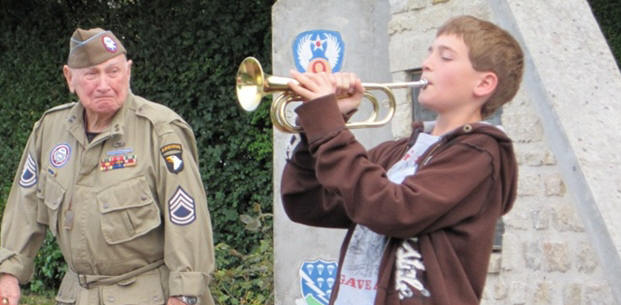
In 2010, Robert Gehrett returned for the first time in Europe.
Intense emotional moment, especially when his young friend, Casey, playing taps near the monument of the 101st Airborne Division in Normandy.
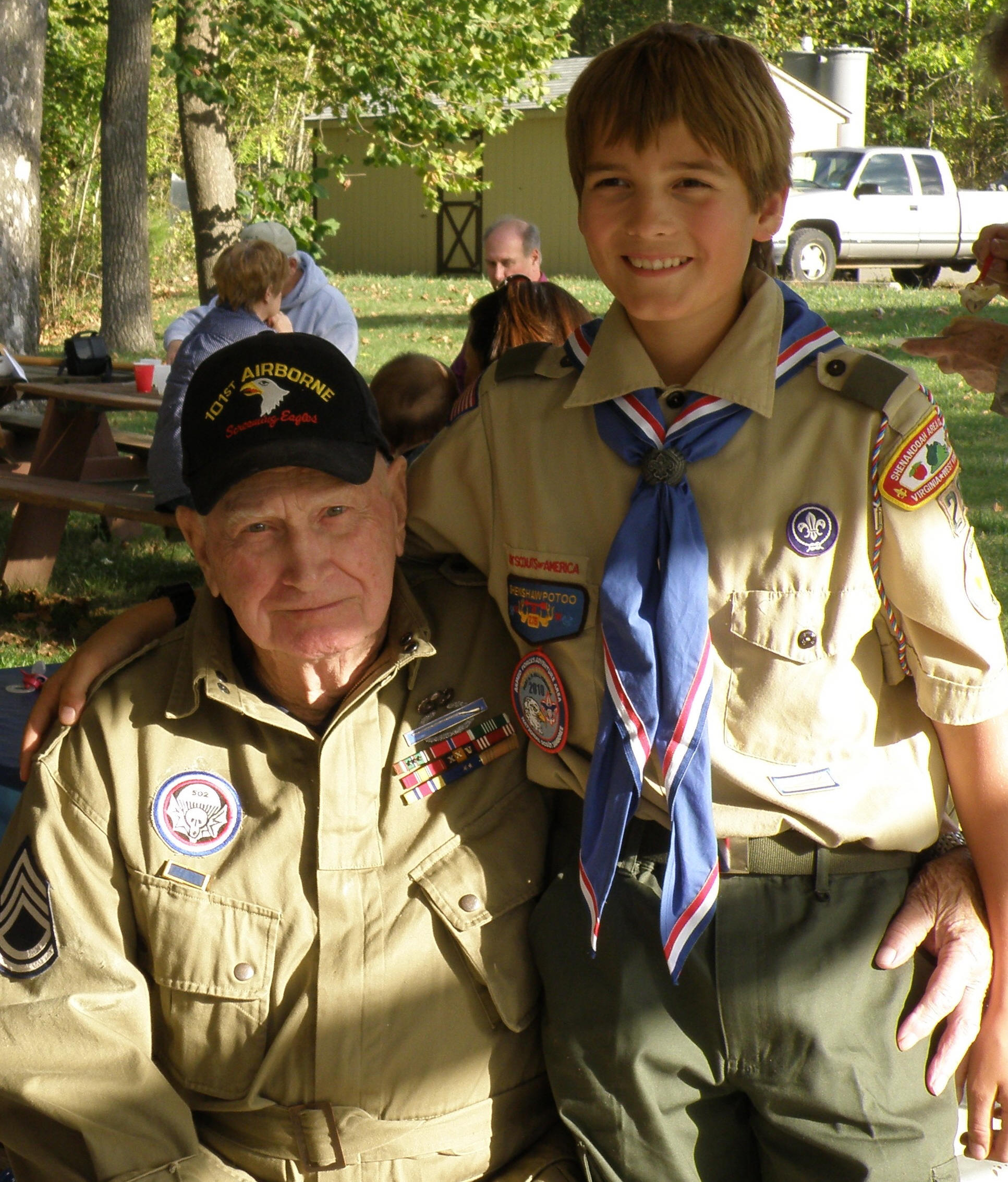
Photo taken in 2010. Robert and his young friend Casey, in Eagle Boy Scout.
Who is the most proud of both?
His decorations are:
Paratrooper wings, Combat Infantry Badge, European campaign with 5 stars, Bronze star meritorious service medal, good conduct, 25 years service, silver defense, silver disabilities with 6 stars, Belgium fourragere, service medal with two stars, victory Europe medal.
